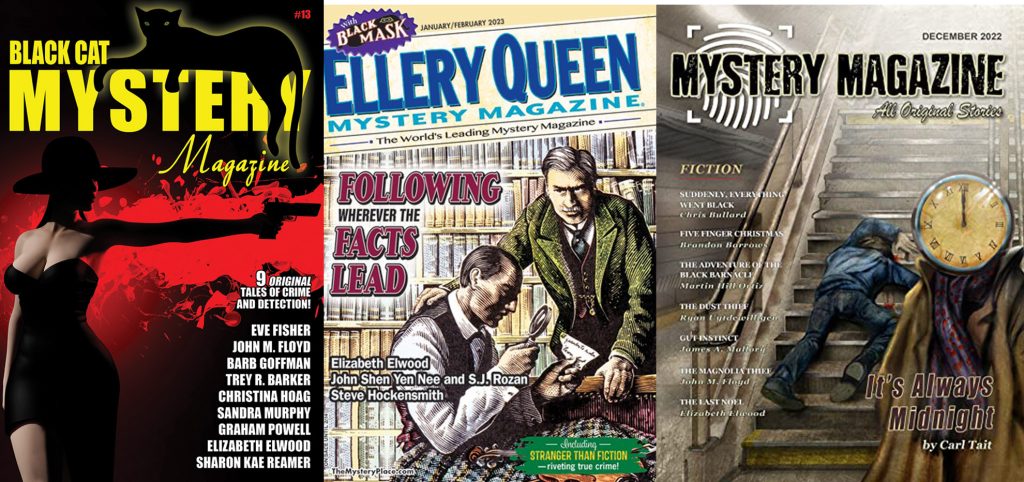
It was such an honour to see my name on the cover of these recent issues of favourite mystery magazines. Mystery Magazine’s December issue contained “The Last Noel”; the January/February issue of EQMM had “The Murder of Sir Henry Baskerville” as the lead story; and “Through the Wall” is in the soon to be published Black Cat Mystery Magazine.
Each of my stories definitely demonstrates the old saying that you should write what you know. “The Murder of Sir Henry Baskerville” not only allowed me to reminisce about the Swinging Sixties, but also let me make use of my many years of theatrical experience. When the actor playing Sir Henry Baskerville plummets to his death from the top of a revolve during the final rehearsal for The Hound of the Baskervilles, naturally, it is the actors playing Holmes and Watson who figure out who fired the fatal shot, but it’s that extra theatrical knowledge that helps them solve the case when the detective sent in to investigate finds himself stumped. All those years backstage in ancient theatres came to very good use.
“The Last Noel” in Mystery Magazine also contained lots of personal memories, this time of the Festive Season – not that we ever had a corpse at our Christmas dinner table. Still, the atmosphere of carols, decorations and Christmas baking is all very real, not to mention the family ups and downs. And could that little gripe of the hostess be real when she complains that, having slogged all day to produce dinner, once she’s cleaned up and is ready to socialize, all the guests who have partied all day decide it’s time to go home?
The most recent story, “Through the Wall” in Black Cat Mystery Magazine, reflects more recent experience. When we moved to the Sunshine Coast in 2019 and hired a contractor to turn our existing cottage into a two-storey house, we never realized what a lengthy and arduous process it would be. Since our house in town sold quickly, we lived in the cottage while the work was done, and daily listened to the hammering and power-tools whining on the other side of the wall. Since the wall was thin, we heard the workmen, too, and presumably, they could hear us. If that alone wasn’t enough to suggest a story, the winter months, with the wind howling through the wood framework, which at that point resembled a castle ruin, created an atmosphere that would have adorned a classic Gothic mystery. I’m so glad that the end product was picked up by Black Cat Mystery Magazine. By the way, No, it wasn’t the contractor who got murdered.
You can find these stories at the links below. All three were great fun to write. I hope you will find them fun to read as well.
Home – Ellery Queen (elleryqueenmysterymagazine.com)
Mystery Magazine | Publisher of Short Crime Fiction
Black Cat Mystery Magazine # 13: Hoag, Christina, Floyd, John M., Elwood, Elizabeth, Powell, Graham, Fisher, Eve, Goffman, Barb, Reamer, Sharon Kae, Barker, Trey R., Murphy, Sandra, King, Rufus: 9781434459947: Amazon.com: Books
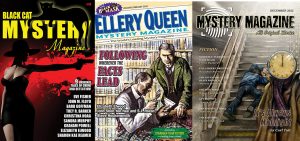
![]() What a joy it was to write a story set on British Columbia’s beautiful Sunshine Coast. King tides and a raging storm provided the inspiration for my latest mystery tale: Black Beacon Books: An Interview with Elizabeth Elwood
What a joy it was to write a story set on British Columbia’s beautiful Sunshine Coast. King tides and a raging storm provided the inspiration for my latest mystery tale: Black Beacon Books: An Interview with Elizabeth Elwood


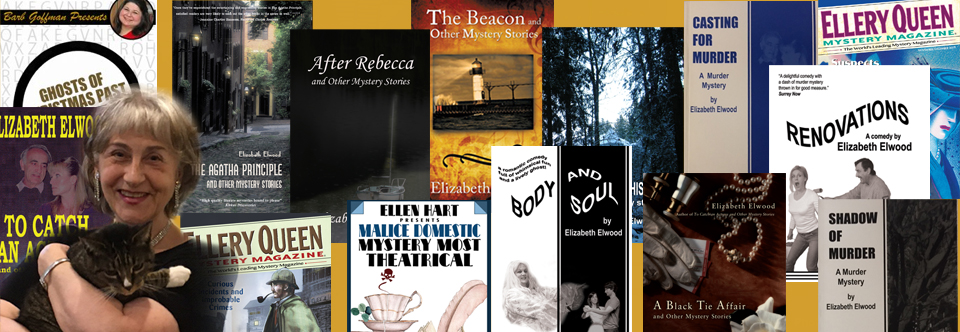



 During a Royal visit in March of 1998, it was announced that Prince (now King) Charles, Prince William and Prince Harry would make a visit to Burnaby South High School. Katie, then fourteen, naturally shared the worldwide crush teenage girls had for the young princes, and she and her friends were desperate to snatch their chance to meet the royals. However, the royal visit was scheduled during the school day, and Katie’s school was in East Burnaby. She begged me to let her have the day off, but given the mobs that were predicted, I pointed out that she would never be able to get close to the princes and flatly refused to give her permission to skip school. She was most annoyed with me, but sulkily acceded and set off for school in the morning. When she returned home that afternoon, she looked smug and was unusually quiet. Nothing more was said and I assumed I was forgiven for being the world’s meanest mother. However, when the two local papers were delivered later that week, I realized why my daughter had looked so pleased with herself. There she was, all smiles, on the front page of both papers, along with the headline, “Burnaby Teens Love the Prince”.
During a Royal visit in March of 1998, it was announced that Prince (now King) Charles, Prince William and Prince Harry would make a visit to Burnaby South High School. Katie, then fourteen, naturally shared the worldwide crush teenage girls had for the young princes, and she and her friends were desperate to snatch their chance to meet the royals. However, the royal visit was scheduled during the school day, and Katie’s school was in East Burnaby. She begged me to let her have the day off, but given the mobs that were predicted, I pointed out that she would never be able to get close to the princes and flatly refused to give her permission to skip school. She was most annoyed with me, but sulkily acceded and set off for school in the morning. When she returned home that afternoon, she looked smug and was unusually quiet. Nothing more was said and I assumed I was forgiven for being the world’s meanest mother. However, when the two local papers were delivered later that week, I realized why my daughter had looked so pleased with herself. There she was, all smiles, on the front page of both papers, along with the headline, “Burnaby Teens Love the Prince”. Katie was only momentarily abashed to find out that she hadn’t got away with her escapade. However, far from being contrite when I waved the newspaper in front of her face, she was jubilant about her triumph and pleased as punch that she’d been proved right. In spite of the crowds, she had succeeded in talking with all three Royals. Charles, she giggled, had a twinkle in his eye, probably because one of her friends had cheekily handed him a slip of paper with her phone number and asked him to give it to Prince William. Having chuckled and told them they were naughty girls, the future king moved on and left the two young princes to shake hands with and charm the girls. A triumph for the teenagers indeed.
Katie was only momentarily abashed to find out that she hadn’t got away with her escapade. However, far from being contrite when I waved the newspaper in front of her face, she was jubilant about her triumph and pleased as punch that she’d been proved right. In spite of the crowds, she had succeeded in talking with all three Royals. Charles, she giggled, had a twinkle in his eye, probably because one of her friends had cheekily handed him a slip of paper with her phone number and asked him to give it to Prince William. Having chuckled and told them they were naughty girls, the future king moved on and left the two young princes to shake hands with and charm the girls. A triumph for the teenagers indeed.

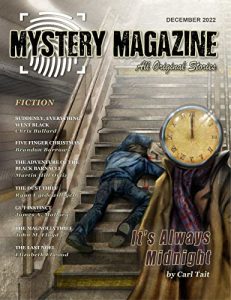 When Grannie Forbes falls face first into the Christmas pudding, no one in the family is particularly sorry, but soon the questions begin. Did someone take a hand to ensure that this was her last Noel? It was wickedly fun to write this one! Read it at:
When Grannie Forbes falls face first into the Christmas pudding, no one in the family is particularly sorry, but soon the questions begin. Did someone take a hand to ensure that this was her last Noel? It was wickedly fun to write this one! Read it at: 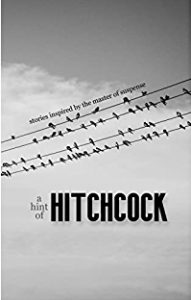 I couldn’t resist answering the call to write a story inspired by one of Alfred Hitchcock’s movies. Being a long-time fan of Daphne du Maurier’s novel, Rebecca, and having enjoyed the film he made of the book, this seemed the perfect choice. But how to write a story that referenced the film, and yet still stood independently – that was the challenge. The solution came to me when I remembered that there had also been a play of Rebecca. I had seen a production of the play when Vagabond Players produced it some years ago and had found it disappointing, for the constrictions of live theatre prevented the playscript from having the dramatic impact that Hitchcock recreated so effectively on film. However, the existence of the play gave me my independent plot. My characters were actors who had starred in the play, and although Rebecca played a strong influence in their lives, their story led in a totally different direction. All the same, I think I managed a Hitchcockian twist at the end. “Rebecca Redux” was great fun to write. I hope readers of the anthology will have as much fun reading it.
I couldn’t resist answering the call to write a story inspired by one of Alfred Hitchcock’s movies. Being a long-time fan of Daphne du Maurier’s novel, Rebecca, and having enjoyed the film he made of the book, this seemed the perfect choice. But how to write a story that referenced the film, and yet still stood independently – that was the challenge. The solution came to me when I remembered that there had also been a play of Rebecca. I had seen a production of the play when Vagabond Players produced it some years ago and had found it disappointing, for the constrictions of live theatre prevented the playscript from having the dramatic impact that Hitchcock recreated so effectively on film. However, the existence of the play gave me my independent plot. My characters were actors who had starred in the play, and although Rebecca played a strong influence in their lives, their story led in a totally different direction. All the same, I think I managed a Hitchcockian twist at the end. “Rebecca Redux” was great fun to write. I hope readers of the anthology will have as much fun reading it. Please join me on Wednesday, October 19, at 5:30 p.m. Pacific time for the official launch of Crime Wave: Women of a Certain Age.
Please join me on Wednesday, October 19, at 5:30 p.m. Pacific time for the official launch of Crime Wave: Women of a Certain Age. I spent many years recording soundtracks for Elwoodettes Marionettes when I lived in town, but since moving to the coast and having the pandemic put an end to performing, my recording equipment has remained idle. Therefore, I was delighted to receive an invitation to record one of my stories for EQMM’s mystery podcast. This was a wonderful opportunity to re-set up my studio for a new and different challenge. The story, which tells how a light on a lagoon provides the clue that a murder has been committed, can be read in the September/October 2022 issue of EQMM. Alternately, you can listen to it at:
I spent many years recording soundtracks for Elwoodettes Marionettes when I lived in town, but since moving to the coast and having the pandemic put an end to performing, my recording equipment has remained idle. Therefore, I was delighted to receive an invitation to record one of my stories for EQMM’s mystery podcast. This was a wonderful opportunity to re-set up my studio for a new and different challenge. The story, which tells how a light on a lagoon provides the clue that a murder has been committed, can be read in the September/October 2022 issue of EQMM. Alternately, you can listen to it at: 
 When I researched these events, I saw that the train crash had occurred in October of 1952, only two months before the Great London Smog, and the discoveries at 10 Rillington Place had burst onto the news in March of 1953. Having realized that there had been three dramatic incidents, all through one winter, lurking in the background of my family’s everyday life, I decided to weave a mystery combining those events with my other childhood memories.
When I researched these events, I saw that the train crash had occurred in October of 1952, only two months before the Great London Smog, and the discoveries at 10 Rillington Place had burst onto the news in March of 1953. Having realized that there had been three dramatic incidents, all through one winter, lurking in the background of my family’s everyday life, I decided to weave a mystery combining those events with my other childhood memories.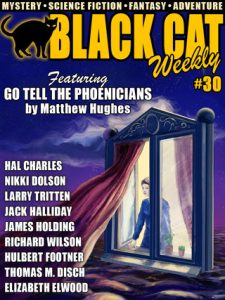 When a third-rate actress falls to her death after accusing a popular anchorman of rape, a narcissistic theatre critic who has murdered a few of her plays, discovers there is more to her story than meets the eye. Read Me Too Too at :
When a third-rate actress falls to her death after accusing a popular anchorman of rape, a narcissistic theatre critic who has murdered a few of her plays, discovers there is more to her story than meets the eye. Read Me Too Too at : 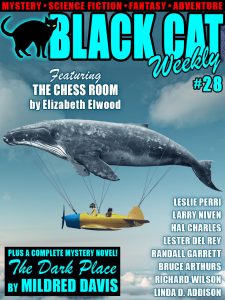 A man is shot dead inside a locked room. He’s found seconds later. No one else was there. Suicide seems the obvious answer, yet Detective Constable Annie Blake thinks it was murder. Can she prove it? Find out in my locked-room mystery, “The Chess Room.” Lots of other fascinating reads within the magazine, too. A treat for mystery lovers. The issue can be purchased here:
A man is shot dead inside a locked room. He’s found seconds later. No one else was there. Suicide seems the obvious answer, yet Detective Constable Annie Blake thinks it was murder. Can she prove it? Find out in my locked-room mystery, “The Chess Room.” Lots of other fascinating reads within the magazine, too. A treat for mystery lovers. The issue can be purchased here: